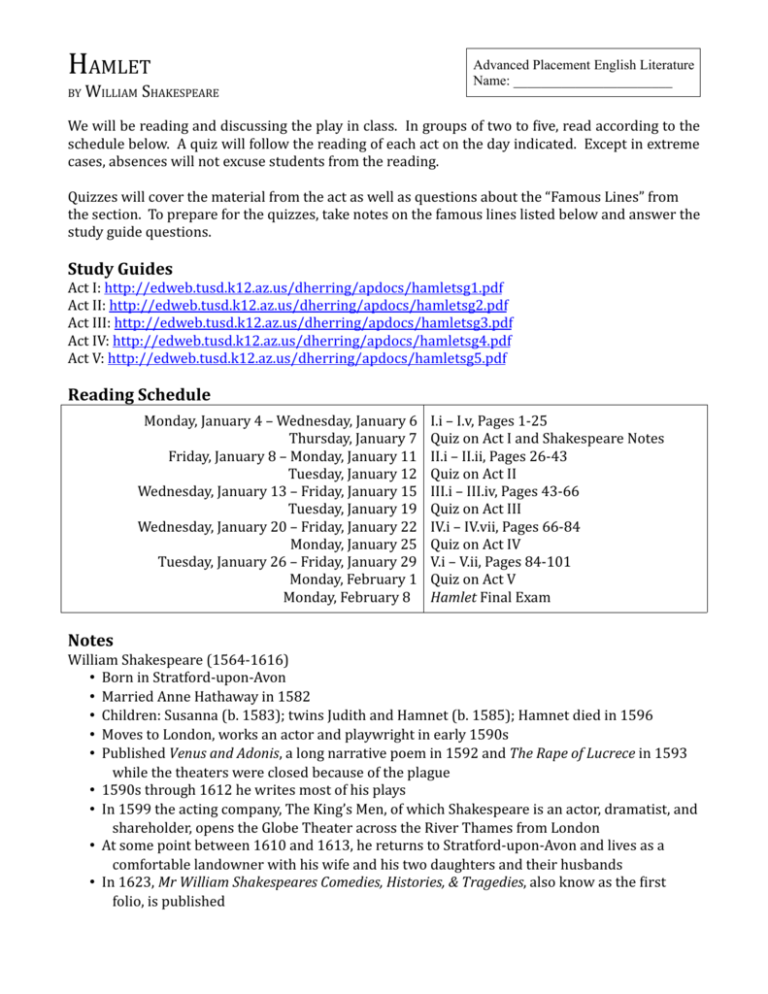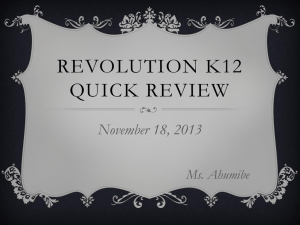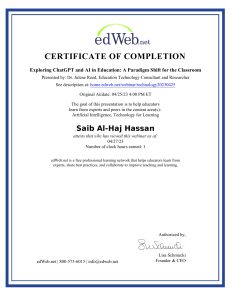Advanced Placement World Literature
advertisement

HAMLET BY WILLIAM SHAKESPEARE Advanced Placement English Literature Name: _______________________ We will be reading and discussing the play in class. In groups of two to five, read according to the schedule below. A quiz will follow the reading of each act on the day indicated. Except in extreme cases, absences will not excuse students from the reading. Quizzes will cover the material from the act as well as questions about the “Famous Lines” from the section. To prepare for the quizzes, take notes on the famous lines listed below and answer the study guide questions. Study Guides Act I: http://edweb.tusd.k12.az.us/dherring/apdocs/hamletsg1.pdf Act II: http://edweb.tusd.k12.az.us/dherring/apdocs/hamletsg2.pdf Act III: http://edweb.tusd.k12.az.us/dherring/apdocs/hamletsg3.pdf Act IV: http://edweb.tusd.k12.az.us/dherring/apdocs/hamletsg4.pdf Act V: http://edweb.tusd.k12.az.us/dherring/apdocs/hamletsg5.pdf Reading Schedule Monday, January 4 – Wednesday, January 6 Thursday, January 7 Friday, January 8 – Monday, January 11 Tuesday, January 12 Wednesday, January 13 – Friday, January 15 Tuesday, January 19 Wednesday, January 20 – Friday, January 22 Monday, January 25 Tuesday, January 26 – Friday, January 29 Monday, February 1 Monday, February 8 Notes I.i – I.v, Pages 1-25 Quiz on Act I and Shakespeare Notes II.i – II.ii, Pages 26-43 Quiz on Act II III.i – III.iv, Pages 43-66 Quiz on Act III IV.i – IV.vii, Pages 66-84 Quiz on Act IV V.i – V.ii, Pages 84-101 Quiz on Act V Hamlet Final Exam William Shakespeare (1564-1616) • Born in Stratford-upon-Avon • Married Anne Hathaway in 1582 • Children: Susanna (b. 1583); twins Judith and Hamnet (b. 1585); Hamnet died in 1596 • Moves to London, works an actor and playwright in early 1590s • Published Venus and Adonis, a long narrative poem in 1592 and The Rape of Lucrece in 1593 while the theaters were closed because of the plague • 1590s through 1612 he writes most of his plays • In 1599 the acting company, The King’s Men, of which Shakespeare is an actor, dramatist, and shareholder, opens the Globe Theater across the River Thames from London • At some point between 1610 and 1613, he returns to Stratford-upon-Avon and lives as a comfortable landowner with his wife and his two daughters and their husbands • In 1623, Mr William Shakespeares Comedies, Histories, & Tragedies, also know as the first folio, is published Famous Lines For each of these famous lines, know the speaker, the listeners, the context and meaning, and the significance of the line. Act I A little more than kin and less than kind. [I.ii.65] O, that this too, too sallied flesh would melt. [I.ii.129] …frailty, thy name is woman! [I.ii.146] A countenance more in sorrow than in anger [I.ii.230] …the primrose path of dalliance [I.iii.50] This above all: to thine own self be true [I.iii.78] Something is rotten in the state of Denmark [I.iv.90] Murder most foul, as in the best it is [I.v.27] Leaver her to heaven [I.v.86] …one may smile and smile and be a villain [I.v.108] There are more things in heaven and earth, Horatio, Than are dreamt of in your philosophy [I.v.165-66] Act II …brevity is the soul of wit [II.ii.90] More matter with less art. [II.ii.95] Though this be madness, yet there is method in ‘t. [II.ii.201] …there is nothing either good or bad but thinking makes it so. [II.ii.241-42] What a piece of work is a man… [II.ii.288] I am but mad north-north-west; when the wind is southerly I know a hawk from a handsaw [II.ii.349-50] What’s Hecuba to him, or he to her [II.ii.516] …the devil hath power T’ assume a pleasing shape [II.ii.556-57] The play’s the thing [II.ii.561] Act III To be or not to be—that is the question [III.i.56] The glass of fashion and the mold of form, Th’ observed of all observers [III.i.149-50] The lady doth protest too much, methinks. [III.ii.212] A king of shreds and patches [III.iv.104] …’tis the sport to have the engineer Hoist with his own petar [III.iv.211] Act IV How all occasions do inform against me [IV.iv.33] There’s such divinity doth hedge a king [IV.v.121] Act V Alas, poor Yorick! I knew him, Horatio [V.i.159] Imperious Caesar, dead and turned to clay [V.i.183] Sweets to the sweet [V.i.213] There’s a divinity that shapes our ends [V.ii.10] There is a special providence in the fall of a sparrow [V.ii.194-95]







